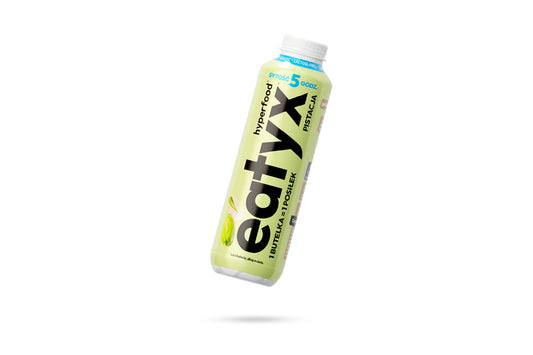Wondering what collagen is and how to naturally increase its levels in your body? This protein is crucial for healthy skin, joints, and bones, and you can support its levels through your diet. Discover which foods to include in your diet to enjoy its benefits.
What is collagen and why is it important?
Collagen is the most important structural protein in the human body, constituting approximately 30% of all proteins. It acts as a scaffolding, providing tissues with elasticity, strength, and tensile strength. It is the basic building block of skin, bones, cartilage, tendons, and ligaments. Unfortunately, with age, the body's natural collagen production declines, leading to wrinkles, weakened joints, and loss of skin firmness. Therefore, it is crucial to understand the composition of collagen so that we can consciously supplement its levels through a well-balanced diet.
Which animal products contain the most collagen?
The richest and most direct source of collagen is animal products. Parts of animals rich in connective tissue are particularly valuable. Long-simmered bone broths (beef, pork, poultry) release collagen into the broth in the form of gelatin. Large amounts are also found in skin (e.g., poultry), cartilage, tendons, and offal. Dishes such as pork knuckles and ribs, which contain these elements, are naturally rich in this valuable protein. The question of what collagen is in most often draws attention to these products.
However, consuming sufficient amounts of these foods daily can be a challenge in today's fast-paced modern lifestyle. For this reason, eatyx LABS collagen PREMIUM beef collagen in mango-passionfruit flavor can be an effective and convenient dietary supplement.
Natural sources supporting collagen synthesis
In addition to directly providing collagen through food, it's crucial to support the body's natural production. This requires specific vitamins and minerals that act as catalysts in the synthesis of this protein. A diet deficient in these nutrients can significantly impair the body's ability to create new collagen fibers, even when consuming foods rich in it. Therefore, a comprehensive approach, combining collagen sources with products that support its synthesis, yields the best results for the health and appearance of the skin, as well as the function of the musculoskeletal system.
Are fish and seafood a good source of collagen?
Yes, fish and seafood are an excellent source of so-called marine collagen, which consists primarily of type I collagen. This type predominates in human skin, making supplementation particularly beneficial for its elasticity and hydration. Collagen is found primarily in the skin, scales, and bones of fish. Therefore, it's worth choosing fish that can be eaten whole, such as sardines, as well as dishes made with skin on, such as salmon. Seafood, such as oysters, is also rich in zinc, copper, and minerals essential for proper collagen production in the body.
Diet and the level of collagen in the body
Your daily diet has a fundamental impact on collagen levels. A diet high in processed foods, especially simple sugars and refined carbohydrates , can lead to a process called glycation. This involves the damage of collagen fibers by sugar molecules, which accelerates skin aging and weakens tissues. A balanced diet, rich in protein, antioxidants, vitamins, and minerals, actively supports collagen synthesis. Consciously planning your meals and understanding what collagen is and what supports its formation is an investment in long-term health.
What plant products support collagen production?
Although plant foods don't contain collagen, they play a crucial role in supporting its synthesis. Vitamin C, found in citrus fruits, berries, peppers, and parsley, is absolutely essential. It acts as a vital collaborator for collagen-producing enzymes. Leafy greens (spinach, kale) provide chlorophyll, which increases collagen in the skin. Legumes, such as beans, are a source of amino acids, and cashews and pumpkin seeds provide zinc and copper—minerals also involved in this process.
The impact of heat treatment and how to compose meals
The way meals are prepared plays a significant role in collagen bioavailability. Long, slow cooking in water, as is the case with broths and bone broths, causes partial hydrolysis of collagen into gelatin. This form is more easily absorbed by the body, but not completely. Cooking increases the solubility of collagen in meat, making it more readily available. To maximize collagen synthesis, it's worth combining collagen sources (meat, fish) with foods rich in vitamin C. For example, adding a bell pepper salad to a meat dish will significantly improve the utilization of amino acids for building new fibers.
Does cooking affect the collagen content of food?
Yes, heat treatment has a direct impact on the collagen in food. Cooking in water is one of the most beneficial methods because it converts insoluble collagen into soluble gelatin, making it easier to digest and absorb. Special attention should be paid to cooking temperature and time – the highest collagen solubility is achieved when cooking at around 100°C. Other methods, such as frying, may not be as effective in extracting this protein. Therefore, dishes like traditional meat aspics or long-simmered broths are the best way to provide the body with digestible collagen.
What is collagen? Supplementation as support
Even the most well-balanced diet usually fails to fully meet the nutritional needs needed to rebuild collagen, especially in older adults, athletes, or during periods of convalescence. The search for answers to the question of what collagen is often leads to the topic of supplementation. Modern supplements contain hydrolyzed collagen, a protein broken down into smaller peptides, which facilitates its absorption and transport to target tissues such as skin or joint cartilage . This is a convenient way to supplement your daily diet.
Are dietary supplements effective in replenishing collagen?
Regularly taking high-quality hydrolyzed collagen supplements can bring tangible benefits. Supplementation can improve skin hydration and elasticity and reduce joint pain. However, for treatment to be effective, consistency is key. Ready-to-drink shots, such as those offered by eatyx with beef collagen , can be a convenient solution. Their excellent, fruity flavor and convenient format make them easy to incorporate into your diet regularly. It's important to remember that supplementation should be a supplement, not a replacement, for a varied diet rich in natural sources of collagen.




